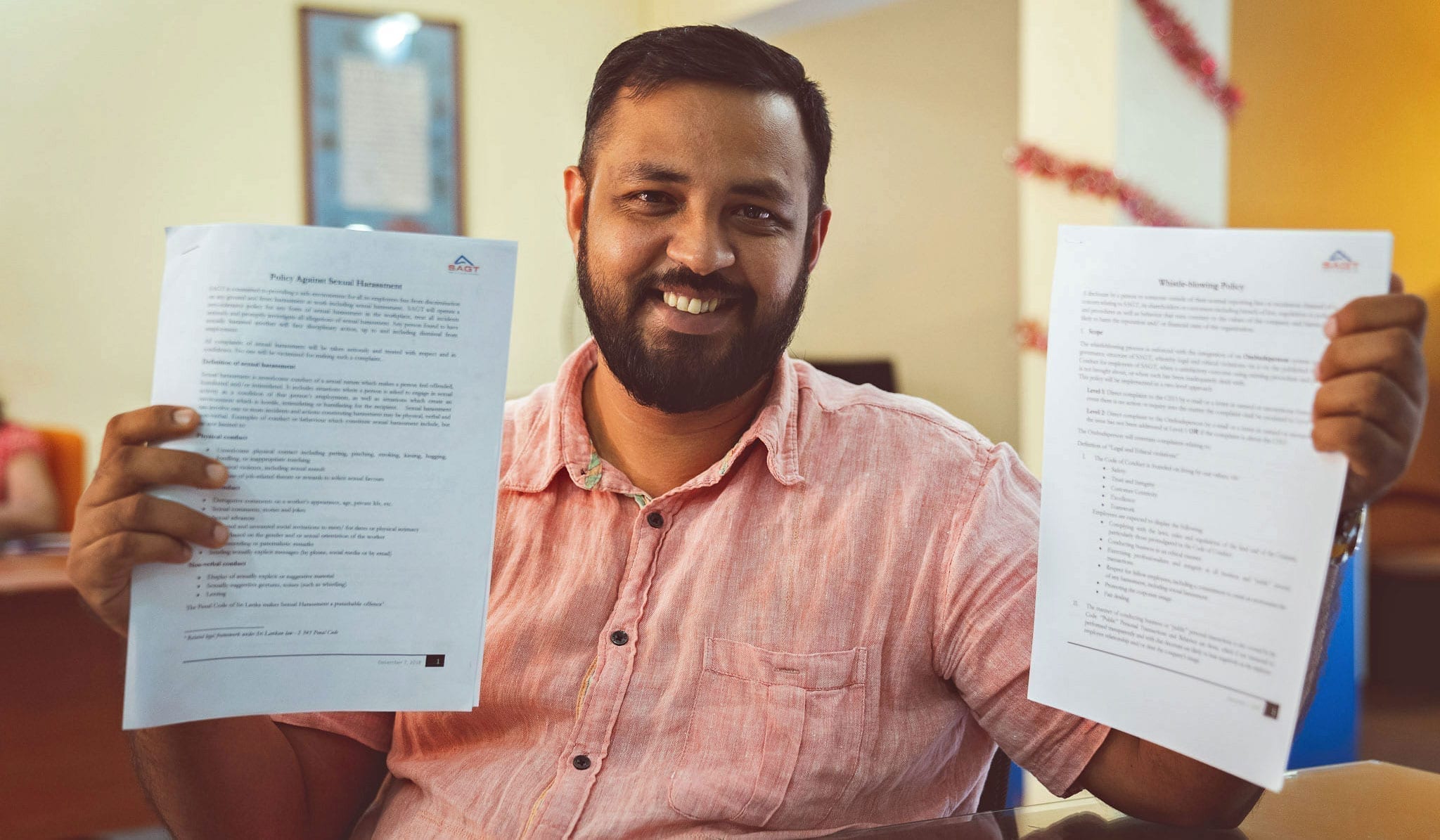
Apr 4, 2019
Union members in Colombo, Sri Lanka, successfully lobbied for a safer workplace by convincing their company to improve policy guidelines to help prevent gender-based violations in the workplace.
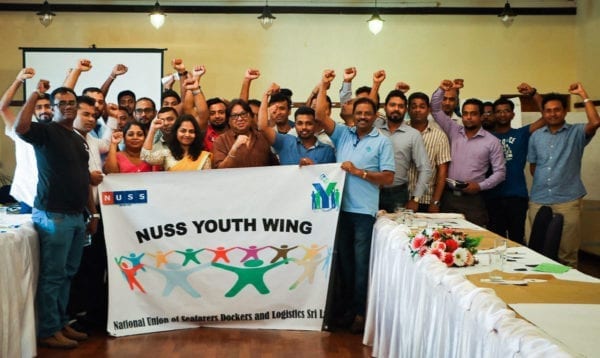
Union members in Sri Lanka celebrate a new workplace policy addressing sexual harassment. Credit: Solidarity Center/Sean Stephens
The effort was inspired by a Solidarity Center awareness-raising training in December on gender-based violence at work in which four workers from the South Asia Gateway Terminal (SAGT)—Ansley De Bruin, Mayura Kanchana, Nilanka Rathnayake and Ruwan Weerasinghe—took part. SAGT operates in Colombo’s shipping port.
“We have spoken to our [human resources] department many times over the past two years on setting a policy against gender-based violence in the workplace,” says Ansley De Bruin, youth wing president of the National Union of Seafarers Sri Lanka (NUSS). “We realized that it would be a hard push to get a code of conduct put in place regarding gender-based violence, so we felt the best thing to push for would be a whistleblower policy.”
After the training, the four participants again met with human resources. Based on their proposal, the organization not only introduced a whistleblower policy a couple of weeks later but also released a separate policy against sexual harassment.

Credit: Solidarity Center/Sean Stephens
The training program outlined incidences that constitute gender-based violence at work and the actions union members can take in supporting the adoption of a global ILO convention (regulation) on gender-based violence in the workplace. It was organized by the National Union of Seafarer’s Sri Lanka (NUSS), along with the International Labor Organization (ILO), International Transport Workers Federation (ITF) and Solidarity Center.
De Bruin says he is grateful SAGT understands its workers’ fundamental rights to a safe, violence-free workplace.
“This is not only a victory for the union but also for the organization and its staff. I would like to thank my organization the South Asia Gateway Terminal for hearing and implementing a system that protects all its staff.”
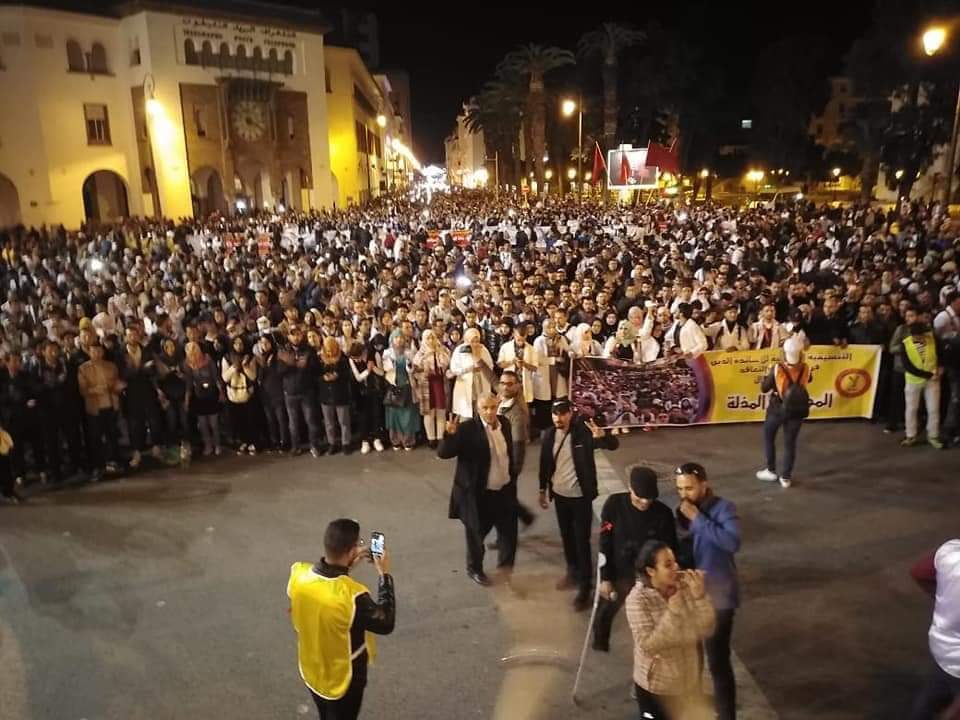
Mar 28, 2019
Recent massive teacher protests in Morocco demanding the government create permanent employment contracts is not an issue confined to the education sector—the extent to which decent jobs are available affects the future of the country, say leaders of the Democratic Labor Confederation (CDT).
A recent government decree making it no longer possible for workers with renewable two-year employment contracts to integrate into the public sector as before means workers have no access to fair wages and social benefits like retirement. The move “outlines the direction and policies of the state to dismantle the public service as a right of citizenship and to disengage from its responsibility towards citizens,” according to a CDT statement.
At least 10,000 teachers protested Sunday in Rabat, Morocco’s capital, to demand the government replace renewable contracts with permanent jobs that offer civil-service benefits, including a better retirement pension.
The Sunday protests came hours after police used water cannon to disperse an overnight demonstration. Many teachers had spent the night in the streets of Rabat after the first event before marching on Sunday from the education ministry to Parliament.
The weekend protests follow nationwide strikes in the education sector on March 13 and 14, and union leaders say more protests are likely.
More than 25% of Young Workers Are Employed
While overall unemployment hovers around 10 percent, more than one-quarter of young people in Morocco are without jobs.
Half of Moroccans who have jobs work in the informal economy, generally in precarious positions with low wages on farms, in construction, textiles and in the food and tobacco industry.
“Despite the strong opposition of the unions, the government is determined to continue hiring with contracts in the education sector and in the public sector in accordance with the recommendations of the international financial institutions, which demand a reduction in the wages,” the Moroccan Labor Union (UMT) says in a statement.
International lenders are pressuring Morocco to trim civil-service wages and cut back on public-sector services.
In addition to CDT and UMT, other unions supporting the march include the Democratic Federation of Labor (FDT), General Union of Moroccan Workers (UGTM) and the National Teaching Federation (FNE).
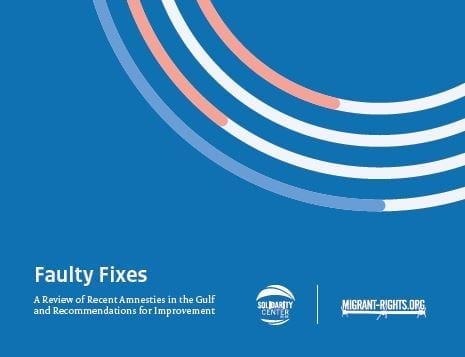
Mar 28, 2019
In Gulf Cooperation Council countries—Bahrain, Kuwait, Oman, Qatar, Saudi Arabia and the United Arab Emirates—amnesties for workers in irregular status are frequently declared, indicating that irregularity is a common and recurring phenomenon within the governing kefala, or work-sponsorship, system. However, even if implemented perfectly, amnesty is a temporary fix, and effective solutions to reduce the population of undocumented migrant workers requires adherence to labor rights principles, according to a new report by the Solidarity Center and Migrant-Rights.org.
The GCC countries are characterized by a majority migrant workforce, tied to their employer-sponsors through kefala. However, for workers whose sponsors fail to renew work visas or for workers who are duped by fake jobs in the recruitment process or who land in untenable and abusive situations, workers “face a series of narrow, unenviable choices and are systematically denied freedoms enshrined in international human rights law,” says the report, Faulty Fixes: A Review of Recent Amnesties in the Gulf and Recommendations for Improvement.
In fact, the report adds: “Migrant workers who are unable to legally leave their job, or leave the country in some cases, are vulnerable to a range of abuses including occupational safety and health violations and gender-based violence as well as non-payment of wages and other forms of forced labor.”
The report has a variety of recommendations for countries of origin and Gulf nations to improve working conditions for migrant workers and to minimize factors that push them into irregular status. Among them: planning and communicating about an amnesty with migrant worker embassies and communities; investigate absent or abusive sponsors; and informing workers about their rights.
See the full report in English and Arabic.
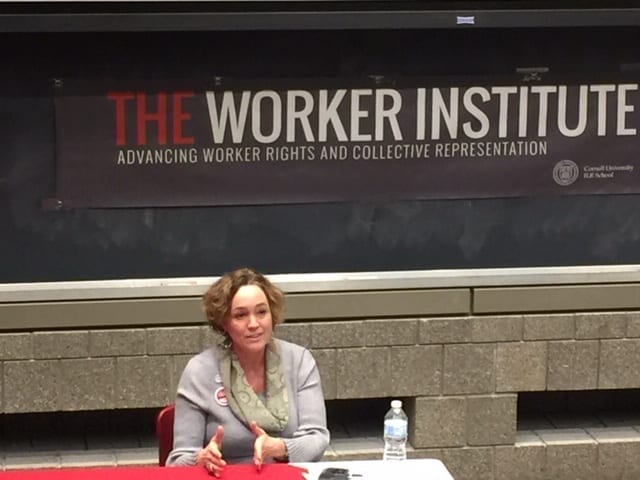
Mar 27, 2019
The global crackdown on human rights, especially worker rights, coupled with rising inequality are disproportionately affecting marginalized populations around the world. At the same time, the rules are skewed to promote profit, deregulation and the expansion of corporate power over people. The answer, said Solidarity Center Executive Director Shawna Bader-Blau, is a global, social-justice labor movement that “stands up and fights back.”
“Collective action is the antidote to injustice,” said Bader-Blau during her keynote speech, “On Our Terms: How We Redefine Democracy and Reverse Exploitation through Social Justice Global Unionism,” at the School of Industrial and Labor Relations (ILR) at Cornell University in Ithaca, New York, last week.
“[T]he restoration of democracy and the building of more just societies needs to be the primary business of all our labor movements,” she said
Bader-Blau spoke to about 100 Cornell students, faculty and the general public in her role as ILR’s 2019 Alice B. Grant Labor Leader in Residence—a multifaceted program that recognizes U.S. and global labor leaders and brings them into Cornell classrooms and the public stage to share their knowledge and expertise. During her time at Cornell—sponsored by the ILR Worker Institute as part of the university’s 2019 Union Days program—Bader-Blau met with students, student labor organizations, ILR and other university faculty, and visited the Tompkins County Workers’ Center (TCWC) in downtown Ithaca.
The challenges Bader-Blau described “are ones that our students will confront as they study and think about how to shape the future of work and labor,” said Alexander Colvin, ILR Interim Dean and Martin F. Scheinman Professor of Conflict Resolution.
Each year, Cornell’s ILR Worker Institute invites a union activist to visit as the Alice B. Grant Labor Leader in Residence to give ILR students the opportunity to learn from the knowledge and experience of labor leaders who reflect the diversity of the labor movement. The ILR School of Cornell University is focused on work, employment and labor policy issues through teaching, research and advocacy outreach.
Previous Alice B. Grant Labor Leaders in Residence include AFL-CIO President Richard Trumka, AFL-CIO Executive Vice President Tefere Gebre, American Federation of Teachers (AFT) President Randi Weingarten, former Pride at Work Co-President Nancy Wohlforth and former Congress of South Africa Trade Unions (COSATU) Regional Secretary Tony Ehrenreich.
Bader-Blau’s presentation was sponsored by the ILR’s Worker Institute and co-sponsored by the People’s Organizing Collective (POC), Cornell Organization for Labor Action (COLA), ILR Graduate Student Association (ILR GSA), Catherwood Library, Cornell’s Law & Society Minor, Undergraduate Labor Institute, ILR Office of Career Services, ILR Office of Student Services, Cornell Farmworker Program and the TCWC.
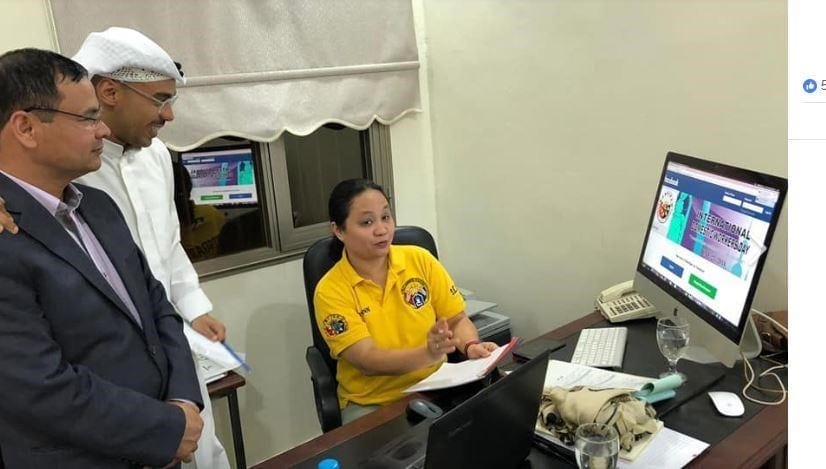
Mar 26, 2019
The Kuwait Trade Union Federation (KTUF) this week celebrated the relaunch of a migrant worker office within its headquarters to help address legal cases related to wage theft or other forms of exploitation brought by migrant workers, including domestic workers, in the country. Two-thirds of Kuwait’s 4.5 million residents are migrant workers, including approximately 660,000 domestic workers.
Millions of migrant workers are trapped in conditions of forced labor and human trafficking around the world, in part as a result of being lied to by labor brokers about the wages and working conditions they should expect. Of the estimated 150 million migrant workers globally, some 67 million labor as domestic workers—83 percent of whom are women—often in isolation and at risk of exploitation and abuse. An International Labor Organization global standard—Convention189 on Domestic Workers—was adopted in June 2011 to protect domestic worker rights.
Domestic worker volunteers from Sandigan-Kuwait, a domestic worker rights organization for Filipino workers, and GEFONT Support Group-Kuwait, an organization for Nepali workers in Kuwait associated with the General Federation of Nepali Trade Unions (GEFONT), will staff the office, encouraging workers to drop in or call to report abuse and request legal assistance from KTUF.
“Nepali laborers abroad have been facing constant suffering, while legal and social rights are not implemented,” says GEFONT Support Group-Kuwait President Ganesh Rawat.
This is the first time that migrant organization volunteers have been invited to participate in the operations of KTUF’s migrant worker office. With support from the Solidarity Center, KTUF will be able to increase its assistance with migrant worker-initiated legal cases.
“The migrant workers’ office opens its doors to all representatives of migrant worker communities, in all categories, to receive complaints,” says KTUF Assistant Secretary General Obeid Menahi Al Ajmi. The federation, he continues, will devote all its resources and tools to support migrant workers, in coordination with the country’s domestic worker department.
The project can be “the avenue on helping each other for the betterment of everyone,” says Sandigan-Kuwait, volunteer organizer, Chito Neri.
Kuwait has been recognized for some important progress on migrant worker issues. A new domestic worker law adopted in 2015, the first in the Gulf Cooperation Council (GCC) region, brought the country closer to compliance with internationally recognized labor standards and included a minimum wage and a maximum 12-hour workday, with one day off per week, for migrant workers such as maids, babysitters, cooks and drivers. Kuwait and the Philippines last year signed a new deal that prohibits common employment practices for migrant workers in the Gulf region, including confiscation of passports by employers.
However, migrant workers remain vulnerable to abuse. Changes to employment conditions may be rejected by private employers, who have a financial incentive for maintaining the status quo. A 2017 International Labor Organization study revealed that a significant percentage of employers in Kuwait took steps to prevent their domestic worker from leaving their employ by denying her a day off, refusing to allow her to leave the house unaccompanied or confiscating her passport—all indicators of forced labor. Domestic workers in Kuwait are not yet allowed to join unions to protect their rights.
Given ongoing challenges, unions say that protection of migrant worker rights requires cross-border, collective action. KTUF last month signed a cooperative agreement in Kuwait City with the Central Organization of Trade Unions-Kenya (COTU-K), formalizing the federations’ effort to jointly address issues affecting workers who migrate from Kenya to Kuwait. KTUF signed a cooperation agreement with the Nepalese Workers’ Union in April last year, committing to joint action in support of worker rights.
The KTUF is an important actor at the national policy level, maintaining a vigorous presence in deliberations on proposed labor law reform, economic restructuring, trade union rights and democratic freedoms. The Solidarity Center supports Kuwaiti unions’ active role in cross-regional collaborations, as well as capacity building programs for Kuwait Trade Union Federation (KTUF) affiliates in the civil service and oil sectors.







